冠词(TheArticle)
- 格式:docx
- 大小:19.41 KB
- 文档页数:5
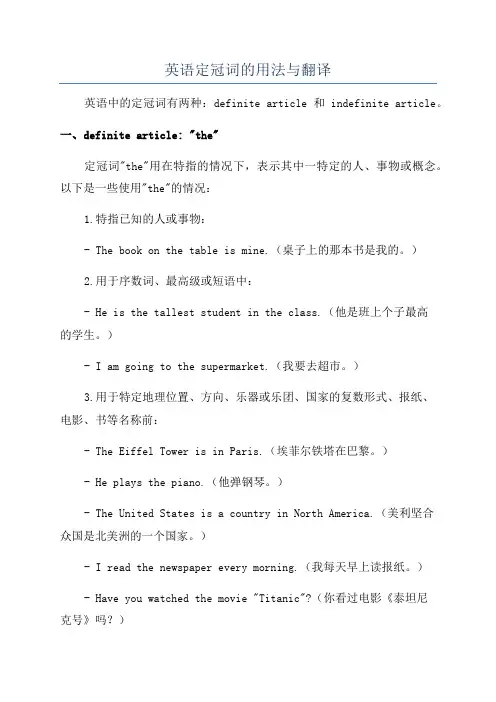
英语定冠词的用法与翻译英语中的定冠词有两种:definite article和indefinite article。
一、definite article: "the"定冠词"the"用在特指的情况下,表示其中一特定的人、事物或概念。
以下是一些使用"the"的情况:1.特指已知的人或事物:- The book on the table is mine.(桌子上的那本书是我的。
)2.用于序数词、最高级或短语中:- He is the tallest student in the class.(他是班上个子最高的学生。
)- I am going to the supermarket.(我要去超市。
)3.用于特定地理位置、方向、乐器或乐团、国家的复数形式、报纸、电影、书等名称前:- The Eiffel Tower is in Paris.(埃菲尔铁塔在巴黎。
)- He plays the piano.(他弹钢琴。
)- The United States is a country in North America.(美利坚合众国是北美洲的一个国家。
)- I read the newspaper every morning.(我每天早上读报纸。
)- Have you watched the movie "Titanic"?(你看过电影《泰坦尼克号》吗?)二、indefinite article: "a"和"an"不定冠词"a"和"an"用于泛指的情况下,表示一个人、事物或概念。
以下是一些使用"a"和"an"的情况:1.表示其中一类事物的一个代表:- I want to buy a car.(我想买辆车。
)2.表示职业、国籍、宗教等身份的一个代表:- He is a doctor.(他是个医生。
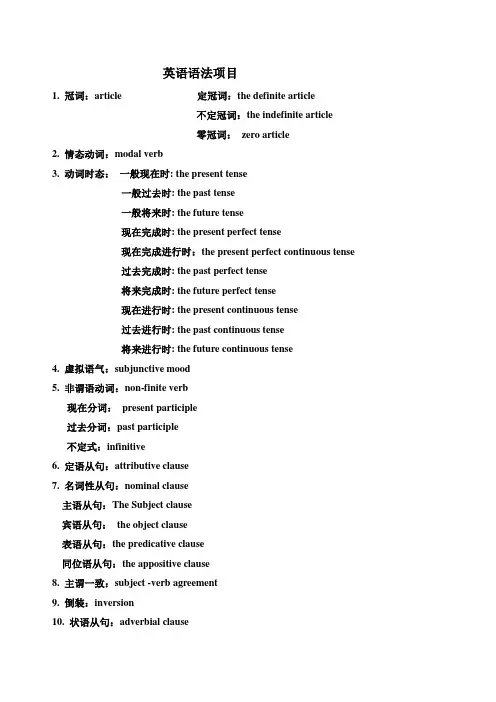
英语语法项目1. 冠词:article 定冠词:the definite article不定冠词:the indefinite article零冠词:zero article2. 情态动词:modal verb3. 动词时态:一般现在时: the present tense一般过去时: the past tense一般将来时: the future tense现在完成时: the present perfect tense现在完成进行时:the present perfect continuous tense过去完成时: the past perfect tense将来完成时: the future perfect tense现在进行时: the present continuous tense过去进行时: the past continuous tense将来进行时: the future continuous tense4. 虚拟语气:subjunctive mood5. 非谓语动词:non-finite verb现在分词:present participle过去分词:past participle不定式:infinitive6. 定语从句:attributive clause7. 名词性从句:nominal clause主语从句:The Subject clause宾语从句:the object clause表语从句:the predicative clause同位语从句:the appositive clause8. 主谓一致:subject -verb agreement9. 倒装:inversion10. 状语从句:adverbial clause。
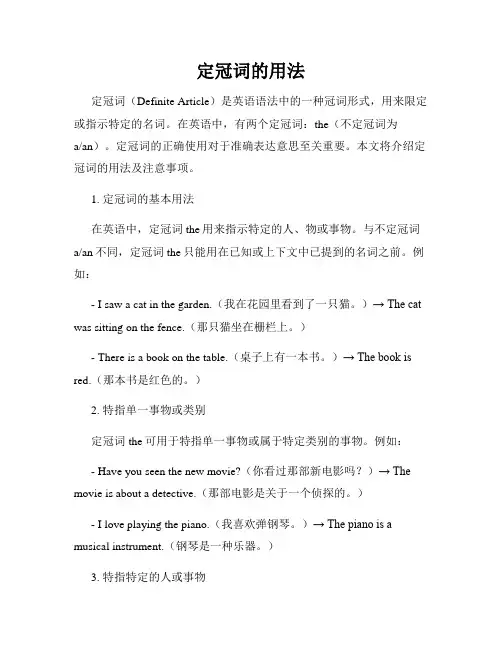
定冠词的用法定冠词(Definite Article)是英语语法中的一种冠词形式,用来限定或指示特定的名词。
在英语中,有两个定冠词:the(不定冠词为a/an)。
定冠词的正确使用对于准确表达意思至关重要。
本文将介绍定冠词的用法及注意事项。
1. 定冠词的基本用法在英语中,定冠词the用来指示特定的人、物或事物。
与不定冠词a/an不同,定冠词the只能用在已知或上下文中已提到的名词之前。
例如:- I saw a cat in the garden.(我在花园里看到了一只猫。
)→ The cat was sitting on the fence.(那只猫坐在栅栏上。
)- There is a book on the table.(桌子上有一本书。
)→ The book is red.(那本书是红色的。
)2. 特指单一事物或类别定冠词the可用于特指单一事物或属于特定类别的事物。
例如:- Have you seen the new movie?(你看过那部新电影吗?)→ The movie is about a detective.(那部电影是关于一个侦探的。
)- I love playing the piano.(我喜欢弹钢琴。
)→ The piano is a musical instrument.(钢琴是一种乐器。
)3. 特指特定的人或事物定冠词the可用于特指已知的人或事物。
例如:- The computer you bought is very expensive.(你买的电脑非常贵。
)- The hotel we stayed at was comfortable.(我们入住的酒店很舒适。
)4. 独特的事物当提到某个特定的事物是独一无二的,或者谈论的事物是在上下文中已明确的情况下,定冠词the可用于指代该事物。
例如:- Have you seen the moon tonight?(你今晚看到月亮了吗?)→ Yes, the moon is full.(是的,月亮是圆的。
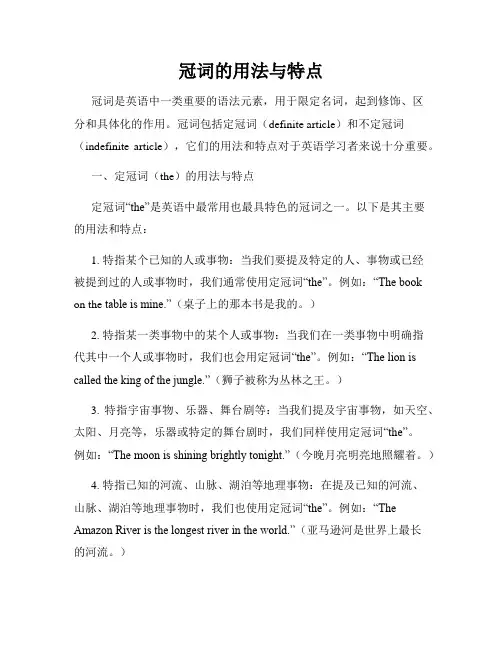
冠词的用法与特点冠词是英语中一类重要的语法元素,用于限定名词,起到修饰、区分和具体化的作用。
冠词包括定冠词(definite article)和不定冠词(indefinite article),它们的用法和特点对于英语学习者来说十分重要。
一、定冠词(the)的用法与特点定冠词“the”是英语中最常用也最具特色的冠词之一。
以下是其主要的用法和特点:1. 特指某个已知的人或事物:当我们要提及特定的人、事物或已经被提到过的人或事物时,我们通常使用定冠词“the”。
例如:“The book on the table is mine.”(桌子上的那本书是我的。
)2. 特指某一类事物中的某个人或事物:当我们在一类事物中明确指代其中一个人或事物时,我们也会用定冠词“the”。
例如:“The lion is called the king of the jungle.”(狮子被称为丛林之王。
)3. 特指宇宙事物、乐器、舞台剧等:当我们提及宇宙事物,如天空、太阳、月亮等,乐器或特定的舞台剧时,我们同样使用定冠词“the”。
例如:“The moon is shining brightly tonight.”(今晚月亮明亮地照耀着。
)4. 特指已知的河流、山脉、湖泊等地理事物:在提及已知的河流、山脉、湖泊等地理事物时,我们也使用定冠词“the”。
例如:“The Amazon River is the longest river in the world.”(亚马逊河是世界上最长的河流。
)二、不定冠词(a/an)的用法与特点不定冠词“a/an”用于表示泛指或不确定的人或事物。
以下是其主要的用法和特点:1. 泛指单数可数名词:当我们想表示某个泛指的人或事物时,我们使用不定冠词“a”或“an”。
例如:“I saw a cat in the garden.”(我在花园里看到一只猫。
)2. 表示职业、国籍、宗教或身份:当我们表达某人的职业、国籍、宗教或身份时,我们通常使用不定冠词“a”或“an”。
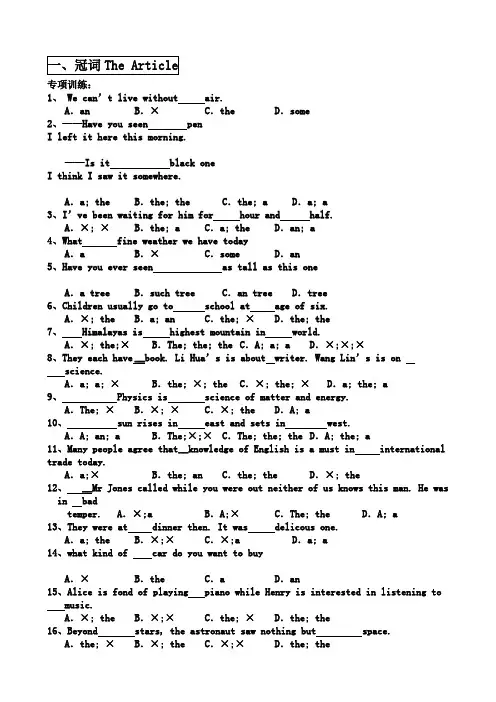
专项训练:1、We can’t live without air.A.an B.×C.the D.some2、——Have you seen penI left it here this morning.——Is it black oneI think I saw it somewhere.A.a; the B.the; the C.the; a D.a; a3、I’ve been waiting for him for hour and half.A.×; ×B.the; a C.a; the D.an; a4、What fine weather we have todayA.a B.×C.some D.an5、Have you ever seen as tall as this oneA.a tree B.such tree C.an tree D.tree6、Children usually go to school at age of six.A.×; the B.a; an C.the; ×D.the; the7、Himalayas is highest mountain in world.A.×; the;×B.The; the; the C.A; a; a D.×;×;×8、They each have __book. Li Hua’s is about writer. Wang Lin’s is onscience.A.a; a; ×B.the; ×; the C.×; the; ×D.a; the; a9、Physics is science of matter and energy.A.The; ×B.×; ×C.×; the D.A; a10、sun rises in east and sets in west.A.A; an; a B.The;×;×C.The; the; the D.A; the; a11、Many people agree that__knowledge of English is a must in international trade today.A.a;×B.the; an C.the; the D.×; the12、__Mr Jones called while you were out neither of us knows this man. He wasin badtemper. A.×;a B.A;×C.The; the D.A; a13、They were at dinner then. It was delicous one.A.a; the B.×;×C.×;a D.a; a14、what kind of car do you want to buyA.×B.the C.a D.an15、Alice is fond of playing piano while Henry is interested in listening tomusic.A.×; the B.×;×C.the; ×D.the; the16、Beyond stars, the astronaut saw nothing but space.17、Alexander Graham Bell invented telephone in 1876.A.×B.a C.the D.one18、——Where’s Jack——I think he’s still in bed, but he might just be in bathroom.A.×;×B.the; the C.the; ×D.×; the19、Many people are still in habit of writing silly things in public places.A.the; the B.×;×C.the; ×D.×; the20、——I’d like information about the management of your hotel, please.——Well, you could have word with the manager. He might be helpful.A.some; a B.an; some C.some; some D.an; a答案:1、B air是不可数名词;2、D 此题为97年高考题;根据句意,第一空是泛指,第一次出现;第二空仍是泛指,且表数量“-”;3、D 元音前用an;4、B weather是不可数名词;5、A 此题为85年高考题;泛指;6、A go to school是固定短语;7、B 山脉、形容词最高级及世界上的唯一的名词前加定冠词;8、A 第一、二空泛指,第三空,science是不可数名词;9、C 第一空,科目前不加冠词;第二空特指,有定语;10、C11、A 第一空,a + 不可数名词表具体的介绍;第二空,trade不可数;12、D 第一空是指有一位琼斯先生在您不在的时候来访;括号里说明,我们俩都不认识这个人,因此不是特指;第二空是固定短语,情绪不好;13、C 第一空at dinner正在吃饭,固定短语;14、A 泛指15、C 此题是89年高考题:乐器前加定冠词;music是不可数名词;16、A 此题是90年高考题:stars前应加定冠词;space不可数;17、C 此题是91年高考题:发明应是特指;18、D 此题是92年高考题;in bed是固定短语,不加冠词;19、C 此题是93年高考题;第一空后有定语,固是特指;第二空, public places,公共场所,泛指;20、A 此题是95年高考题;information是不可数名词;have a word with sb.是固定短语;二、名词Nouns专项训练:1、There are only twelve in the hospital.A.woman doctors B.women doctorsC.women doctor D.woman doctor2、Mr Smith has two , both of whom are teachers in a school.A.brothers-in-law B.brother-in-lawsC.brothers-in-laws D.brothers-in law——Four.A.stomaches B.stomach C.stomachs D.stomachies4、Some visited our school last Wednesday.A.German B.Germen C.Germans D.Germens5、The of the building are covered with lots of .A.roofs; leaves B.rooves; leafs C.roof; leaf D.roofs; leafs 6、When the farmer returned home he found three missing.A.sheeps B.sheepes C.sheep D.sheepies7、That was a fifty engine.A.horse power B.horses powerC.horse powers D.horses powers8、My father often gives me .A.many advice B.much advice C.a lot of advices D.a few advice 9、Mary broke a while she was washing up.A.tea cup B.a cup of tea C.tea’s cup D.cup tea10、Can you give us some about the writerA.informations B.informationC.piece of informations D.pieces information11、I had a cup of and two pieces of this morning.A.teas; bread B.teas; breadsC.tea; breads D.tea; bread12、As is known to us all, travels much faster than .A.lights; sounds B.light; soundC.sound; light D.sounds; lights13、She told him of all her and .A.hope; fear B.hopes; fearC.hopes; fears D.hope; fears14、The rising did a lot of to the crops.A.water; harm B.water; harmsC.waters; harm D.waters; harms15、——How far away is it from here to your school——It’s about.A.half an hour’s drive B.half hours drivesC.half an hour drives D.half an hour drive16、The shirt isn’t mine. It’s.A.Mrs Smith B.Mrs’ SmithC.Mrs Smiths’D.Mrs Smith’s17、Miss Johnson is a friend of .A.Mary’s mother B.Mary’s mothers’C.Mary mother’s D.Mary’s mother’s18、Last week I called at my .A.aunt B.aunts C.aunt’s D.auntes’A.stone B.stones C.stones’D.stone’s20、I can hardly imagine sailing across the Atlantic Ocean in five days.A.Peter’B.Peter C.Peters D.Peters’答案:1、B2、A3、C stomach胃虽是“ch”结尾,但其发音为k,所以加“s”,不用加“es”;4、C5、A roof, chief, gulf, belief等词的复数形式,直接加“s”;6、C7、A 名词作定语一般不用复数;8、B9、A 根据句意,打破的应是杯子,而不是茶;名词作定语表类别不用加“’s”;10、B 11、D 12、B 13、C 14、C 15、A16、D 根据上句,此处应是史密斯太太的衬衫;17、D 18、C 19、D a stone’s throw是固定短语,意为“近在咫尺”;20、B 此句中Peter作动名词sailing的所有格,本应用Peter’s,但因其在动词后作宾语,所以可用宾格,因此B为正确答案;专项训练1、Nothing but cars in the shop.A.is sold B.are sold C.were sold D.are going to sell2、No one except Jack and Tom the answer.A.know B.knows C.is knowing D.are known3、Seventy percent of the students in our school from the countryside.A.is B.are C.comes D.are coming4、of the money used up.A.Three-five, are B.Three-fifths, have beenC.Three-fifths, has been D.Third-fifths, is5、The number of the people who cars increasing.A.owns, are B.owns, is C.own, is D.own, are6、One of Marx’s works written in English in the 1860s.A.was B.were C.would be D.are7、The sheets for your bed washing.A.needs B.are needing C.want D.are wanting8、On each side of the street a lot of trees.A.stands B.grow C.is standing D.are grown9、Some person calling for you at the gate.A.are B.is C.is being D.will be10、All that can be eaten eaten up.A.are being B.has been C.had been D.have been11、Tom’s teacher and friend Mr. Smith.A.are B.is C.are being D.has12、Your new clothes fit you, but mine me.A.doesn’t fit B.don’t fit C.doesn’t fit for D.don’t fit for 13、Neither he nor I for the plan.A.am B.are C.is D.wereA.has made B.have made C.has been made D.had made15、Peter, perhaps John, playing with the little dog.A.is B.are C.were D.seems16、Laying eggs the ant queen’s full-time job.A.is B.are C.has D.have17、Between the two buildings a monument.A.stand B.stands C.standing D.is standing18、I, who your good friend, will share your joys and sorrow.A.am B.is C.are D.was19、The United Nations in 1945.A.were found B.were founded C.was founded D.was found20、were also invited to the party.A.Mr Smith B.The Smith C.The Smiths D.Smiths21、The glass works in 1959.A.were set up B.was set up C.were put up D.were built22、Three hours with your girl friend to be a short time.A.seem B.seems C.is seeming D.has seemed23、It was reported that six including a boy.A.was killed B.were killed C.was killing D.had killed24、The police a prisoner.A.is searching for B.are searching forC.is searching D.are searched for 25、Deer faster than dogs.A.run B.runs C.are running D.will run26、The wounded good care of here now.A.is taken B.are being taken C.are taking D.is taking27、The whole class greatly moved at his words.A.was B.were C.had D.is28、Over 80 percent of the population of China peasants.A.was B.is C.are D.will be29、There a knife and fork on the table.A.seems to be B.seem to be C.is seeming to be D.are30、Those who singing may join us.A.are liking B.likes C.enjoy D.is fond of31、His family music lovers.A.all are B.are all C.is D.are being32、A professor and a writer present at the meeting.A.was B.is C.were D.had been33、The pair of shoes worn out.A.was B.were C.have been D.had been34、The students in our school each an English dictionary.A.have B.has C.had D.are having35、More than one answer to the question.A.have been given B.has been given C.were given D.had given36、The boy sitting by the window is the only one of the students who from the countryside in our school. A.are B.is C.were D.wasA.is B.are C.was D.were38、Most of the mistakes because of carelessness.A.were made B.are made C.has been made D.were making39、Most of his time in reading novels.A.are spent B.is spent C.were spent D.was spending40、The rest of the novel very interesting.A.were B.are C.is D.seem41、I know that all getting on well with her.A.was B.is C.are D.were42、When and where this took place still unknown.A.are B.were C.is D.has43、Not only the workers but also the machine not there.A.are B.were C.is D.has44、Very few his address in the town.A.knows B.know C.are knowing D.has known45、Ten thousand dollars a large sum of money.A.are B.is C.were D.seem46、Twenty miles a long way to cover.A.were B.are C.is D.seem to be47、Nine plus three twelve.A.makes B.make C.is making D.are making48、There are two roads and either to the station.A.leads B.lead C.are leading D.is leading49、My father, together with some of his old friends, there already.A.have been B.has been C.had been D.will be50、My family as well as I glad to see you.A.am B.are C.is D.was答案:1、A 因有连词but,所以谓语形式跟Nothing一致,用第三人称单数;见讲解4;2、B 同上3、B 见讲解2;4、C 见讲解16;5、C 定语从句看被修饰的先行词:the number of作主语用单数形式;见讲解9,19;6、A 见讲解1;7、C 见讲解2;8、B 倒装句,要看后面的主语;见讲解3;9、B some person指“某人”是第三人称单数;见讲解13;10、B 主语“all”指的是“food”,所以代不可数名词,是第三人称单数;见讲解13;11、B Tom’s teacher and friend,因friend前没有冠词,所以实际指的是同一个人;见讲解5;12、B 根据前一分句的意思,第二分句中的mine指的是“my new clothes”,因此主语是复数;13、A neither…nor…连接主语,动词与后面的主语保持一致;见讲解15;14、A 见讲解6; 15、A 见讲解4; 16、A 见讲解1,动名词作主语; 17、B 倒装,见讲解3; 18、A 见讲解9; 19、C 见讲解11;20、C 因谓语动词是复数,所主语应是复,The Smiths是指史密斯一家人;21、B works在此句中是指工厂,所以是单数; 22、B 见讲解10;23、B six在这儿指的是人,因此用复数形式; 24、B 见讲解17;25、A deer, sheep是单、复数同形,根据后面的dogs,前面的deer应是复数单数是指全班的成员; 28、C 见讲解18; 29、A 见讲解5;刀、叉是一副而论,所以看作单数;30、C 见讲解9; 31、B 见讲解12; 32、C 见讲解4,注意与第11题比较;33、A 因此句主语是pair,所以用单数;34、A 因此句主语是the students,所以用复数;如果each作主语,谓语动词则用第三人称单数形式;如:Each of the students / Each student has an English dictionary.35、B 此句中的主语是one answer,所以谓语动词应与它保持一致;36、B 根据句意,这个男孩是学校中唯一来自农村的学生,自然后面的定语从句的主语是单数,所以谓语动词用单数形式,又因主从句时态保持一致,故B 是唯一正确答案;37、A 见讲解12; 38、A 见讲解2;39、B 见讲解16;40、C 这部小说的剩余部分,还没超出“一”,用单数;41、C 见讲解13,不定代词all在此句中代“与她相处的人”,所以是复数;42、C 见讲解1,when and where this took place是一个从句;43、C 见讲解15; 44、B few在此代人,是复数; 45、B 见讲解10;46、C 同上; 47、A 同上; 48、A 见讲解7; 49、B 见讲解4; 50、B 同上;专项训练1、It is important that a college student a foreign language.A.will master B.master C.masters D.would master2、It is strange that she without saying a word.A.should have gone out B.wentC.should go out D.goes out3、If my lawyer here last Saturday, he me from going.A.had been, would have prevented B.had been, would preventC.were, would prevent D.were, would have prevent4、——“He is a brave man.”——“Yes, I wish I his courage.”A.have B.had C.will have D.may have5、If it rain, the crops would be saved.A.should B.will C.is going to D.was to6、He ordered that the medicine by a special plane.A.was sent B.would be sentC.should send D.be sent7、If you the medicine, you better now.A.took, would feel B.had taken, feltC.had taken, would feel D.took, would have felt8、She is my sister, but she often acts as if my mother.A.is B.was C.were D.had been9、I went to bed early last night, but I wish I so.A.didn’t do B.hadn’t do C.haven’t done D.couldn’t do10、I’d rather he tomorrow afternoon.A.will come B.comes C.coming D.came答案:1、B2、A3、A4、B5、A专项训练Ⅰ、选择填空1、 that we all went out, lying in the sun.A.The weather so fine was B.So fine was the weatherC.So the weather was fine D.So was fine weather2、Under his arm a pair of shoes which he had bought from the shop a few days before.A.is B.are C.was D.were3、 who had arrested him three times for carrying drugs.A.Before George stood the policemanB.Before George the policeman stoodC.Before the policeman stood GeorgeD.Before George did the policeman4、Then we had been looking forward to .A.came the hour B.the hour cameC.comes the hour D.the hour is coming5、Only when he started to explain the reason for this.A.she realized B.did she realizeC.she had realized D.had she realized6、 succeed in doing anything.A.Only by working hard we canB.By only working hard we canC.Only by working hard can weD.Only we can by working hard7、Not for a moment the truth of your story.A.he has doubted B.he doubtsC.did he doubt D.he did doubt8、Nowhere else in the world cheaper tailoring than in Hong Kong.A.a tourist can find B.can a tourist findC.a tourist will find D.a tourist has found9、Hardly when the bus suddenly pulled away.A.they had got to the bus-stop B.they got to the bus-stopC.did they get to the bus-stop D.had they got to the bus -stop10、Mary doesn’t speak French, and does Joan.A.not B.neither C.either D.so11、—Do you know Jim quarrelled with his brother —I don’t know, .A.nor don’t I care B.nor do I careC.I don’t care neither D.I don’t care also12、Not until the early years of the 19th century what heat is.A.man did know B.man knewC.didn’t man know D.did man know13、After that we never saw her again nor from her.C.had we heard D.we have heard14、John won the first prize in the contest. .A.So he did. B.So did he.C.So he did, too. D.So did he, too.15、,he doesn’t study well.A.As he is clever B.He is as cleverC.Clever as he is D.As clever he is16、You can never use my tape recorder. time should you touch that machine.A.At no B.At any C.Any D.No17、Scarcely the room the phone rang.A.I had entered…when B.Had I entered…thenC.had I entered…when D.have I entered…when18、Only save his life.A.can the doctor B.the doctor canC.will the doctor D.could the doctor19、Hardly anybody the boy , because he is rude.A.does like B.likes C.do like D.like20、So well that the teacher praised her.A.she had done her homeworkB.her homework had been doneC.did she do her homeworkD.she did her homework21、Only when to know him will you get along with him.A.do you come B.will you comeC.you come D.you will come22、Out , gun in hand.A.did he rush B.rushed heC.he rushed D.had he rushed23、He had promised me to come to the party ,and .A.so did he B.so he did C.so he would D.so would he 24、Into the sky the light blue smoke.A.went up B.up went C.did go up D.had gone up25、Little about his own life at the meeting.A.did he talk B.he talkedC.he was talking D.had he talked26、Under no circumstances first use nuclear weapons.A.will China B.China will C.does China D.do China27、 taken that examination, she could have passed it .A.Were she B.Had she be able toC.If she would have D.Had she28、 tomorrow , we would put off the match till next Monday.A.Should it rained B.Were it to rainC.If it would rain D.Had it rained29、Look, here .A.Mr. Brown comes B.does Mr. Brown come30、Often us good advice.A.did she give B.she did giveC.she gave D.she has given31、Not until I began to work how much time I had wasted.A.didn’t I realize B.did I realizeC.I didn’t realize D.I realize32、Little about his own safety , though he was in great danger himself.A.does he care B.did he careC.he cares D.he cared33、 began our new lesson.A.But B.Thus C.Such D.So that34、By no means look down upon the poor.A.we should B.we should notC.do we D.should we35、Only when 30 years old to learn English.A.was he , did he begin B.he was , he beganC.was he , he began D.he was ,did he begin36、Not once their plan.A.did they change B.they changedC.changed they D.they did changed37、“It’s very hot today.”“ .”A.So it is B.So is it C.So does it D.So it does38、A fish needs water and without water it will die.A.So does a man B.So will a manC.So it is with a man D.So is it with a man39、They arrived at the farmhouse, in front of which .A.sat a small boy B.a small boy satC.is sitting a small boy D.a small boy sitting40、Society has changed and in it .A.so have the people B.so the people haveC.the people have so D.have the people soⅡ、改错41、Only when was he 50 years old did he begin to learn French.42、Little she knew Tom was was badly ill43、Turn to the right and there are you.44、And all around the fox in a circle was dogs.45、—You can learn English well.—So can we.46、I dare climb this tall tree, but do you47、Not once he kept his promise.48、Many a time he has given us some good advice.49、Such a noise there was that I couldn’t work in the room.50、Only does my mother understand me.Ⅰ、1、B 2、C 3、A 4、A 5、B 6、C 7、C 8、B9、D 10、B 11、B 12、D 13、A 14、A 15、C 16A17、C 18、B 19、B 20、C 21、C 22、C 23、B 24A25、A 26、A 27、D 28、B 29、C 30、A31、B 32、B 33、B 34、D 35、D 36、A37、A 38、C 39、A 40、AⅡ、41、was he —he was 倒装主句不倒装从句;42、She knew—did she know 此句为半倒装句;43、are you —you are 此句为全部倒装句如主语是代词则不倒装;44、was—were主语是dogs ;45、so we can 主语we与上一句中的主语you所指相同故不同倒装;46、do you—dare you 前面句中用情态,后面要呼应;47、he kept—did he keep48、he has—has he49、50、去掉does,将understand改为understands;only后面跟状语倒装,后跟主语不倒装;专项训练:一、用适当的并列连词填空:1、He couldn’t know the truth about me, he wouldn’t treat me like this.2、The bell is ringing the lesson is over.3、Although he was ill, he kept on working.4、I can’t make up my mind we will go to Shanghai we will stay in our city.5、He doesn’t talk much, he thinks a lot.6、It must have rained last night the ground is still wet.7、The president will visit the town in May he will open the new hospital.8、Jane was dressed in green Mary was dressed in blue.9、he did not speak distinctly I did not hear it clearly.10、He is clever, , he often makes mistakes.11、did we write to her we called up her.12、He hasn’t any money I’m going to lend him some.13、The child was sick; he, , didn’t go to school.14、Mary was neither happy, was she sad.15、Put on more clothes, you’ll catch cold.二、选择最佳答案:16、Some are reading magazines, others are playing cards.A.or B.for C.so D.while17、We must get up early tomorrow. we’ll miss the first bus to the Great Wall.A.so B.or C.but D.however18、——I don’t like chicken fish.——I don’t like chicken, I like fish very much.A.and, and B.and, but C.or, and D.or, but19、We want high speed good quality.A.both, and B.either, or C.neither, nor D.not, but also20、In spring it is hot cold here.A.both, and B.either, or C.neither, nor D.not only, but21、does he writes well, he also speaks well.A.Not only, but B.Not, but C.Either, or D.Both, and22、Use your head, you’ll work it out.A.so B.or C.and D.for23、I want to buy the jacket, I have not enough money with me.A.but B.so C.or D.for24、you I am going to help Tom.A.Either, or B.Not, but C.Not only, and D.Each, and25、The soldier was wounded, he pushed on.A.for B.and C.so D.yet26、——Do you know Jim quarrelled with his classmate——I don’t know, .A.nor don’t I came B.nor do I careC.I don’t care neither D.I don’t ca re also27、He is a teacher, a singer as well.A.but B.or C.nor D.and28、should a man have courage, he should have wisdom and knowledge.A.Not only, but B.Neither, nor C.Either, or D.Both, and 29、We have studied English for only one year, we can perform English short plays already.A.yet B.for C.and D.or30、She had escaped, the ring had fallen off and been damaged in the great heat of the fire.A.so B.or C.but D.and31、The work was difficult, ,he finished in on time.A.but B.however C.otherwise D.therefore32、The sky was cloudless the sun was shining.A.but B.and C.for D.so33、many times, but he still couldn’t understand it.A.Having been told B.Though he had been toldC.He was told D.Having told34、I was walking along the street I heard someone calling my name.A.when B.while C.and D.for35、To be healthy, you must have a meal too big too small.A.either, or B.neither, nor C.not only, but also D.not, but36、Both Jane and Ellen, Mary, are studying at the same college.A.too B.and C.as well D.as well as37、He has never studied English before, we should give him more help.A.and B.or C.therefore D.but38、I see your point of view; , I don’t agree with you.A.or B.but C.so D.still39、They must stay in the water they will die.A.but B.so C.otherwise D.and40、We played outside till sunset it began to rain.A.when B.while C.yet D.so三、改错:41、Although he has great learning, but he always works far into the night.42、Because the boy is very naughty, so I’m angry with him.43、Not only he himself works hard but he often helps others.44、It must have rained much of late, because the river is so high.45、They didn’t tell me whether I should write to him nor whether I should see him personally.46、If there were no plants, we would have no animals or no meat.47、Now of course I don’t want to say anything bad about anyone however have you noticed his strange manners48、“I’m more thankful to you, sir, than I can say” I said, “ and but I must make things clear.”49、He neither knows nor cares for what happened.50、He did not like your suggestion, and but he raised no objection反对.答案:一、1、or 2、and 3、still / yet 4、when, or 5、but6、for7、when8、while9、Either, or 10、however11、Not only, but 12、so 13、therefore 14、nor15、or二、16、D 17、B 18、D 19、A 20、C 21、A22、C 23、A 24、A 25、D 26、B 27、D28、A 29、A 30、C 31、B 32、B 33、C34、A 35、B 36、D 37、C 38、D 39、C 40、A三、41、去掉but或改为yet 42、去掉so43、he前加does;works-work44、because-for45、nor-or46、or—and47、however—but48、去掉and49、去for50、去掉and 或把but改为yet 或still专项训练1.Football is a very interesting game , is played all over the world.A.that B.which C.it D.who2.Is there anything else you requireA.which B.that C.who D.what3.The last place we visited was the Great Wall.A.which B.that C.where D.it4.He talked happily about the men and books interested him greatly in the school.A.which B.who C.it D.that5.The reailway tunnel,though the train goes, will be completed soon.A.which B.that C.it D.whom6.His uncle works in a factory bicycles are made.A.that B.which C.where D.there7.There is no dictionary you can find everything.A.that B.which C.where D.in that8.Next month, you’ll spend in your hometown is coming.A.which B.that C.when D.where9.Next month, you’ll be in your hometown is coming.A.which B.that C.when D.where10.I often thought of my childhood , I lived on a farm.A.which B.where C.when D.who11.He wanted to know the time he needed to know .A.that B.when C.where D.what12.There isn’t so much noise in the country in big cities.A.that B.which C.where D.as13.They could only read such stories had been rewritten in simple English .A.that B.which C.as D.what14.The stems of bamboo are hollow makes them very light.A.which B.as C.that D.it15.Crusoe’s dog hecame ill and died , made him very lonely .A.as B.which C.that D.this16.They’ve invited me to their party , is kind of them.A.as B.which C.That D.this17. we know now ,bats come out only at night .A.As B.Which C .That D.What18.John got beaten in the game , had been expected .A.as B.that C.what D.who19. has been said above ,grammar is a set of dead rules.A.Which B.What C.That D.As20.Do you know the reason he was lateA.that B.which C.for what D.for which21.He built a telescope he could study the skies.A.in which B.with that C.through which D.by it22.I have bought two ballpens , writes well .A.none of which B.neither of which C.none of them D.neither of them23.There are two thousand students in our school , are girls .A.of whom two thirds B.two -thirds of them C.two -third in them D.two -thirds in which24.Do you know the manA.whom I spoke B.to who I spoke C.I spoke to D.that I spoke 25.The factory we’ll visit next week isn’t far from here .A.where B.in which C.which D.to which26.This is one of the best films this year.A.have been shown B.that have shown C.that have been shown D.which has been shown27.Can you lend me the book the other dayA.you talked about B.about that you talked C.that you talkedD.which you talked28.Is there any one in you class family is in the city .A.who B.who’s C.which D.whose29.I’ll never forget the days we stayed together.A.when B.in which C.which D.what30.Is some German friends visited last weekA.this school B.this the school C.this school one D.this school where31.I’ll tell you he told me last month .A.all which B.all what C.that all D.all32.Do you know the reason she got so angry yesterdayA.for why B.for that C.which D.why33.I still remember the day she first wore that pink dress.A.which B.in which C.on that D.on which34.I’ll show you a store you may buy all you need .A.in which , / B.where , which C.which , that D.that , that 35.Winter is the time of year the days are short and nights are long.A.where B.when C.that D.on which36.The train she was travelling was late.A.which B.on which C.for which D.on that37.The second World War millions of people were killed ended in 1945.A.during which B.in that C.where D.on which38.Is oxygen the only gas helps fire burnA.that B./ C.which D.it39.This is the best hotel in the city I know .A.which B.that C.where D.it40.I’ve read all the books were borrowed from the library .A.that B./ C.which D.they41.The scientist and his achievements you told me about are admired by us all.A.which B.who C.that D.whose42.She hasn’t got enough money to buy the rings .A.which B.that C.with which D.for which43.Finally came the day he bad to beging his study for the next term.A.which B.since C.that D.till44.We hope to get such a tool he is using .A.which B.as C.that D.where45.Is there anything to you .A.that is belonged B.that belongs C.which belongs D.that belong 46.You can take any seat is free .A.which B.where C.that D.in which47.The old woman has two sons ,one is a teacher.A.of them B.of which C.of whom D.of who48.My hometown is no longer the same it used to be .A.which B.as C.that D.like49.You may take anything useful .A.you want B.what you want C.you want them D.which you want 50.He tore up my photo and upset me .A.that B.it C.which D.what51.During the days , he worked as a servant at the Browns.A.followed B.following C.to follow D.that followed52.The beautiful dress Miss Jones went to the ball was borrowed from a friend of hers .A.that B.wearing which C.worn by D.in which53.The clever boy made a hole in the wall , he could see what was going on inside the house.A.in which B.through which C.at which D.on which54.The brave man , the tiger was shor is a good bunter.A.by which B.by whom C.by that D.of whom55.The knife we used to cut the bread is very sharp .A.with which B.with it C.with that D.which答案:1 B2 B3 B4 D5 A6 C7 C8 A9 C 10 C11 A 12 D 13 C 14 A 15 B 16 B 17 A 18 A19 D 20 D21 C 22 B 23 A 24 C 25 C 26 C 27 A 28 D29 A 30 B31 D 32 D 33 D 34 A 35 B 36 B 37 A 38 A39 B 40 A41 C 42 C 43 C 44 B 45 B 46 C 47C 48 B49 A 50A51 D 52 D 53 B 54 B 55 A。
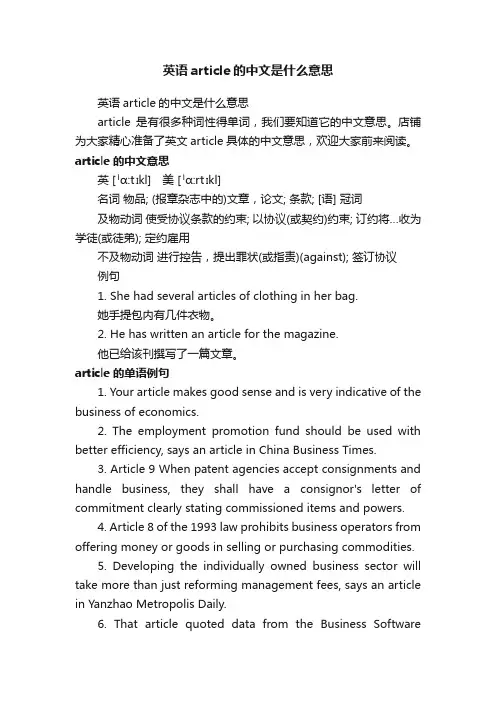
英语article的中文是什么意思英语article的中文是什么意思article是有很多种词性得单词,我们要知道它的中文意思。
店铺为大家精心准备了英文article具体的中文意思,欢迎大家前来阅读。
article的中文意思英 [ˈɑ:tɪkl] 美 [ˈɑ:rtɪkl]名词物品; (报章杂志中的)文章,论文; 条款; [语] 冠词及物动词使受协议条款的约束; 以协议(或契约)约束; 订约将…收为学徒(或徒弟); 定约雇用不及物动词进行控告,提出罪状(或指责)(against); 签订协议例句1. She had several articles of clothing in her bag.她手提包内有几件衣物。
2. He has written an article for the magazine.他已给该刊撰写了一篇文章。
article的单语例句1. Your article makes good sense and is very indicative of the business of economics.2. The employment promotion fund should be used with better efficiency, says an article in China Business Times.3. Article 9 When patent agencies accept consignments and handle business, they shall have a consignor's letter of commitment clearly stating commissioned items and powers.4. Article 8 of the 1993 law prohibits business operators from offering money or goods in selling or purchasing commodities.5. Developing the individually owned business sector will take more than just reforming management fees, says an article in Yanzhao Metropolis Daily.6. That article quoted data from the Business SoftwareAlliance, which stated that software piracy rates in China exceeded 90 per cent.7. Male cosmetics are a big business in China, so big that Bloomberg recently ran an article about the trend.8. It by no means indicates any concession on the question of national sovereignty, the article said.9. The US Senate on Tuesday passed an omnibus act on government spending, which includes an article targeting Chinese poultry products.article的词典解释1. (报纸、杂志的')文章An article is a piece of writing that is published in a newspaper or magazine.e.g. ...a newspaper article...一篇报载文章e.g. ...a travel article...一篇游记2. 物品;物件You can refer to objects as articles of some kind.e.g. ...articles of clothing...衣物e.g. He had stripped the house of all articles of value.他把房间里值钱的东西洗劫一空。
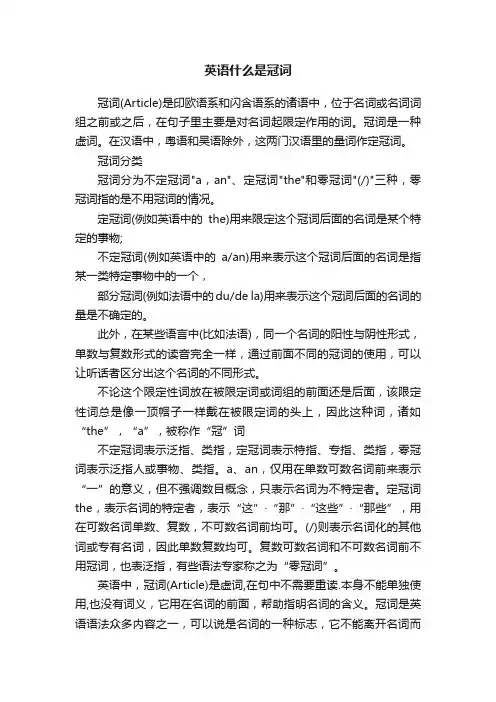
英语什么是冠词冠词(Article)是印欧语系和闪含语系的诸语中,位于名词或名词词组之前或之后,在句子里主要是对名词起限定作用的词。
冠词是一种虚词。
在汉语中,粤语和吴语除外,这两门汉语里的量词作定冠词。
冠词分类冠词分为不定冠词"a,an"、定冠词"the"和零冠词"(/)"三种,零冠词指的是不用冠词的情况。
定冠词(例如英语中的the)用来限定这个冠词后面的名词是某个特定的事物;不定冠词(例如英语中的a/an)用来表示这个冠词后面的名词是指某一类特定事物中的一个,部分冠词(例如法语中的du/de la)用来表示这个冠词后面的名词的量是不确定的。
此外,在某些语言中(比如法语),同一个名词的阳性与阴性形式,单数与复数形式的读音完全一样,通过前面不同的冠词的使用,可以让听话者区分出这个名词的不同形式。
不论这个限定性词放在被限定词或词组的前面还是后面,该限定性词总是像一顶帽子一样戴在被限定词的头上,因此这种词,诸如“the”,“a”,被称作“冠”词不定冠词表示泛指、类指,定冠词表示特指、专指、类指,零冠词表示泛指人或事物、类指。
a、an,仅用在单数可数名词前来表示“一”的意义,但不强调数目概念,只表示名词为不特定者。
定冠词the,表示名词的特定者,表示“这”·“那”·“这些”·“那些”,用在可数名词单数、复数,不可数名词前均可。
(/)则表示名词化的其他词或专有名词,因此单数复数均可。
复数可数名词和不可数名词前不用冠词,也表泛指,有些语法专家称之为“零冠词”。
英语中,冠词(Article)是虚词,在句中不需要重读.本身不能单独使用,也没有词义,它用在名词的前面,帮助指明名词的含义。
冠词是英语语法众多内容之一,可以说是名词的一种标志,它不能离开名词而独立存在。
表示名词的数量或者特征。
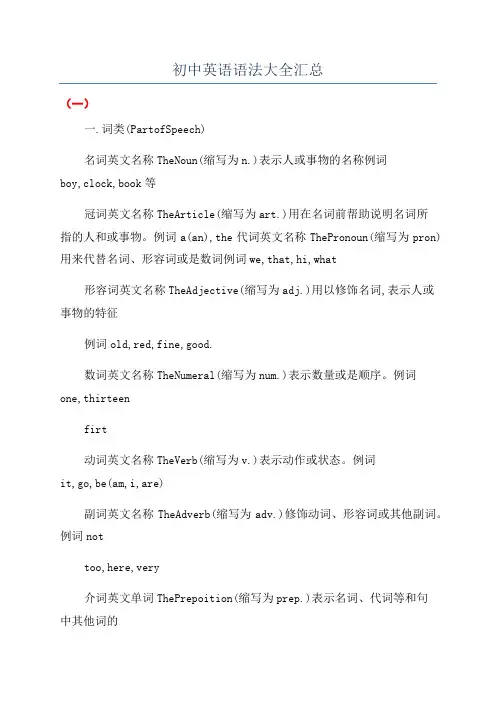
初中英语语法大全汇总(一)一.词类(PartofSpeech)名词英文名称TheNoun(缩写为n.)表示人或事物的名称例词boy,clock,book等冠词英文名称TheArticle(缩写为art.)用在名词前帮助说明名词所指的人和或事物。
例词a(an),the代词英文名称ThePronoun(缩写为pron)用来代替名词、形容词或是数词例词we,that,hi,what形容词英文名称TheAdjective(缩写为adj.)用以修饰名词,表示人或事物的特征例词old,red,fine,good.数词英文名称TheNumeral(缩写为num.)表示数量或是顺序。
例词one,thirteenfirt动词英文名称TheVerb(缩写为v.)表示动作或状态。
例词it,go,be(am,i,are)副词英文名称TheAdverb(缩写为adv.)修饰动词、形容词或其他副词。
例词nottoo,here,very介词英文单词ThePrepoition(缩写为prep.)表示名词、代词等和句中其他词的关系。
例词in,on,of,to,under.连词英文单词TheConjunction(缩写为conj.)用来连接词与词、短语与短语或句与句。
例词and,or,but.感叹词英文单词TheInterjection(缩写为interj.)表示说话时的喜悦、惊讶等情感。
例词oh,hello,hi,er.二.名词(Noun)1.总的说来,名词分专有名词和普通名词两类。
专有名词:表示具体的人,事物,地点或机构的专有名称。
LucyChina中国Aia亚洲Beijing北京专有名词的第一个字母要大写。
普通名词:表示某些人,某类事物,某种物质或抽象概念的名称。
例如: teacher老师tea茶reform改革普通名词又可进一步分为四类1)个体名称:表示单个的人和事物。
houe马car汽车room房间apple苹果fun风扇picture照片2)集体名称:表示一群人或一些事物的名称。
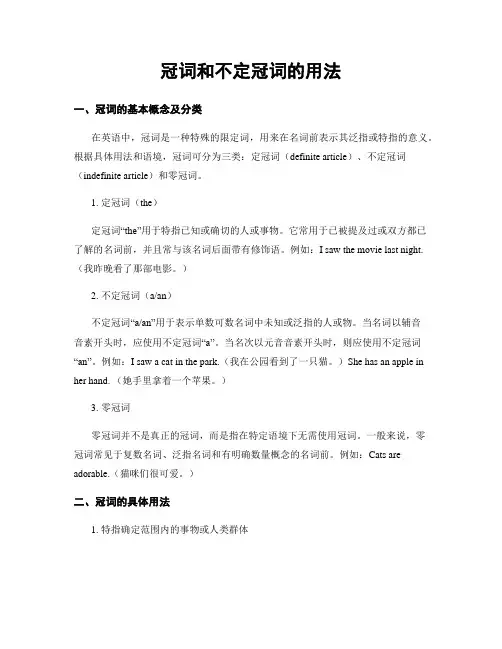
冠词和不定冠词的用法一、冠词的基本概念及分类在英语中,冠词是一种特殊的限定词,用来在名词前表示其泛指或特指的意义。
根据具体用法和语境,冠词可分为三类:定冠词(definite article)、不定冠词(indefinite article)和零冠词。
1. 定冠词(the)定冠词“the”用于特指已知或确切的人或事物。
它常用于已被提及过或双方都已了解的名词前,并且常与该名词后面带有修饰语。
例如:I saw the movie last night.(我昨晚看了那部电影。
)2. 不定冠词(a/an)不定冠词“a/an”用于表示单数可数名词中未知或泛指的人或物。
当名词以辅音音素开头时,应使用不定冠词“a”。
当名次以元音音素开头时,则应使用不定冠词“an”。
例如:I saw a cat in the park.(我在公园看到了一只猫。
)She has an apple in her hand. (她手里拿着一个苹果。
)3. 零冠词零冠词并不是真正的冠词,而是指在特定语境下无需使用冠词。
一般来说,零冠词常见于复数名词、泛指名词和有明确数量概念的名词前。
例如:Cats are adorable.(猫咪们很可爱。
)二、冠词的具体用法1. 特指确定范围内的事物或人类群体定冠词“the”用于特指确定范围内的事物或人类群体。
例如:The sun is shining brightly.(太阳照耀得明亮。
)The students are studying in the library.(学生们正在图书馆学习。
)2. 表示某一类别当我们需要表达某一类别或示范时,通常使用不定冠词“a/an”。
例如:A dog isa loyal animal.(狗是忠实的动物。
)An apple a day keeps the doctor away.(一天一个苹果,医生远离我。
)3. 描述职业、国籍和个人身份在描述职业、国籍和个人身份的时候,常使用不定冠词“a/an”。
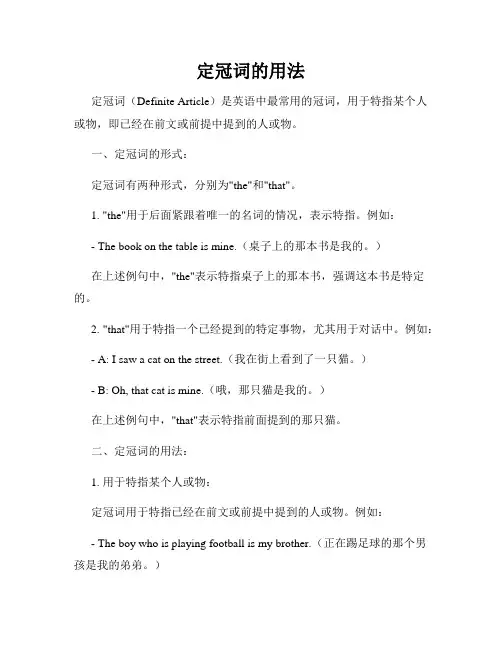
定冠词的用法定冠词(Definite Article)是英语中最常用的冠词,用于特指某个人或物,即已经在前文或前提中提到的人或物。
一、定冠词的形式:定冠词有两种形式,分别为"the"和"that"。
1. "the"用于后面紧跟着唯一的名词的情况,表示特指。
例如:- The book on the table is mine.(桌子上的那本书是我的。
)在上述例句中,"the"表示特指桌子上的那本书,强调这本书是特定的。
2. "that"用于特指一个已经提到的特定事物,尤其用于对话中。
例如:- A: I saw a cat on the street.(我在街上看到了一只猫。
)- B: Oh, that cat is mine.(哦,那只猫是我的。
)在上述例句中,"that"表示特指前面提到的那只猫。
二、定冠词的用法:1. 用于特指某个人或物:定冠词用于特指已经在前文或前提中提到的人或物。
例如:- The boy who is playing football is my brother.(正在踢足球的那个男孩是我的弟弟。
)在这个例句中,"the"指的是上文中的男孩,因为在前文中已经提到他在踢足球。
2. 用于特指某个群体或类别中的人或物:定冠词还可用于特指某个群体或类别中的人或物。
例如:- The tiger is a fierce animal.(老虎是一种凶猛的动物。
)在这个例句中,"the"指的是老虎这个特定的动物类别。
3. 用于表示乐器、报刊、舞台剧等特定的事物:定冠词还用于表示特定的乐器、报刊、舞台剧等。
例如:- I play the piano.(我弹钢琴。
)在这个例句中,"the"指的是特定的钢琴。
4. 用于序数词前:定冠词也可用于序数词前,表示特定的顺序。
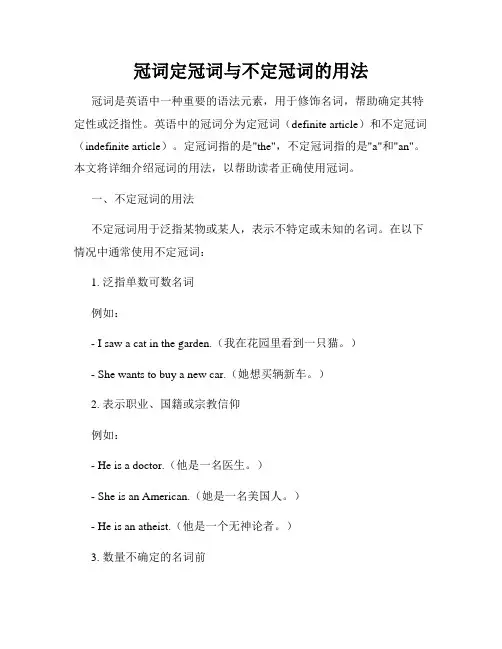
冠词定冠词与不定冠词的用法冠词是英语中一种重要的语法元素,用于修饰名词,帮助确定其特定性或泛指性。
英语中的冠词分为定冠词(definite article)和不定冠词(indefinite article)。
定冠词指的是"the",不定冠词指的是"a"和"an"。
本文将详细介绍冠词的用法,以帮助读者正确使用冠词。
一、不定冠词的用法不定冠词用于泛指某物或某人,表示不特定或未知的名词。
在以下情况中通常使用不定冠词:1. 泛指单数可数名词例如:- I saw a cat in the garden.(我在花园里看到一只猫。
)- She wants to buy a new car.(她想买辆新车。
)2. 表示职业、国籍或宗教信仰例如:- He is a doctor.(他是一名医生。
)- She is an American.(她是一名美国人。
)- He is an atheist.(他是一个无神论者。
)3. 数量不确定的名词前例如:- Can I have an apple?(我可以吃一个苹果吗?)- Would you like a cup of coffee?(你想喝杯咖啡吗?)4. 表示"每"的概念例如:- She goes to the gym three times a week.(她每周去健身房三次。
)- He reads a book a month.(他每月读一本书。
)二、定冠词的用法定冠词用于特指已知的名词,或者表示泛指的名词已经被提及过。
在以下情况中通常使用定冠词:1. 特指单数名词例如:- The cat in the garden is black.(花园里的那只猫是黑色的。
)- Please pass me the salt.(请把盐递给我。
)2. 特指复数名词例如:- The students are studying in the library.(学生们在图书馆学习。
冠名词知识点总结冠名词(Article)是英语中的一类专有词汇,用来修饰名词,起到指明特指或泛指的作用。
在英语中,一共有三种冠名词,分别是定冠词(the)、不定冠词(a/an)和零冠词(zero article)。
掌握冠名词的使用规则和特点,对于理解和运用英语语法具有非常重要的意义。
本文将从定义、种类、用法和注意事项等方面对冠名词进行详细的总结。
一、定冠词定冠词(the)是英语中唯一的一种定冠词,在句子中可以用来指明特指的名词,也可以用来与特定名词连用。
1. 用法(1)与特指名词连用The是用来指明特指名词的,即说话者和听话者都知道这个名词是哪个,或者在上下文中有提及。
比如,The books on the desk are mine.(桌上的书是我的。
)(2)与特定名词连用The还可以用在特定名词前面,表示这个名词是上文所提到的某个具体事物。
比如,I met the girl who you mentioned yesterday.(我昨天见过你提到的那个女孩。
)2. 注意事项定冠词的用法相对较灵活,但是在使用的时候需要注意以下几个方面:(1)用在某些固定短语中比如,at the same time(同时)、in the end(最后)、on the whole(总的来说)等。
(2)用在单数名词复数名词前面比如,the news(新闻)、the Chinese(中国人)等。
(3)用在姓氏前面比如,the Smiths(史密斯一家)。
二、不定冠词不定冠词有两种形式,分别是a和an,用来指示泛指的名词。
1. 用法(1)用在单数可数名词前面不定冠词用在名词前面,表示这个名词代表的是泛指的一个东西。
比如,I want to buy a book.(我想买一本书。
)(2)用在以辅音音素开头的单词前面当名词以辅音音素(consonant sound)开头的时候,要使用a。
比如,a book(一本书)、a pen(一支笔)。
冠词总结定冠词和不定冠词的用法冠词总结:定冠词和不定冠词的用法冠词是英语语法中重要的一部分,分为定冠词(definite article)和不定冠词(indefinite article)。
在英语中,冠词的使用非常灵活,但也有一定的规律和约束。
本文将对定冠词和不定冠词的用法进行总结和归纳。
一、定冠词(The)的用法:1. 特指已提及或可明确理解的人、物或概念时使用定冠词:- The boy is playing in the park.(那个男孩正在公园里玩。
)- I saw the movie you recommended.(我看了你推荐的那部电影。
)2. 特指唯一或独一无二的人、物或概念时使用定冠词:- The sun rises in the east.(太阳从东方升起。
)- She is the president of the company.(她是公司的总裁。
)3. 特指整个类别或一类人、物时使用定冠词:- The lion is known as the king of the jungle.(狮子被誉为丛林之王。
)- The rose is a symbol of love.(玫瑰是爱的象征。
)4. 特指上下文中已提及的人、物或概念时使用定冠词:- I bought a car. The car is red.(我买了一辆车。
那辆车是红色的。
) - I have a cat. The cat is sleeping.(我养了一只猫。
那只猫在睡觉。
)5. 特指某个领域或方面时使用定冠词:- The history of China is very long.(中国的历史非常悠久。
)- He is an expert in the field of biology.(他是生物学领域的专家。
)二、不定冠词(A/An)的用法:1. 指称某个不具体或未提及的人、物或概念时使用不定冠词:- I saw a cat on the street.(我在街上看到了一只猫。
冠词和不定冠词的用法区别冠词和不定冠词是英语中常见的语法现象。
它们在句子中扮演着重要的角色,帮助我们确定名词的具体含义和范围。
然而,对于很多学习者来说,区分两者的使用方式并不容易。
本文将详细介绍冠词和不定冠词的用法区别,并提供一些例句加以说明。
一、冠词(Definite Articles)1. 用法简介:冠词分为定冠词(definite article) 和不定冠词(indefinite article) 两种形式。
而在这两种形式中,我们首先讨论的是定冠词 ("the") 的用法。
- 定义或特指某个事物或人;- 泛指一类事物或人。
2. 特点:定冠词 "the" 区别于其他类型的冠词,它有以下几个特点:- "the" 只有一个形式,在单数与复数名词前都通用;- "the" 常常与特定名次搭配使用,表示特指某个事物或人;- "the" 还可以与某些固定短语中的名次连用。
3. 例句说明:下面通过例句来更好地理解定冠词的用法:a) "The cat is sitting on the roof."(这只猫坐在屋顶上。
)在这个例句中,我们使用了定冠词 "the" 来表示特指屋顶上的那只猫。
b) "I want to buy the book you recommended."(我想要买你推荐的书。
)在这个例句中,我们使用了定冠词 "the" 来特指所讨论的那本书。
二、不定冠词(Indefinite Articles)1. 用法简介:不定冠词是描述数量、身份或者属性等相对模糊的名词前常用的一种形式。
英语中唯一的不定冠词是 "a" 和 "an"。
- 指示单个事物或人;- 泛指某类事物或人;- 表示数字表达方式中一个事物。
英语八大词性:掌握词汇的灵魂在英语学习之旅中,词性是我们理解和使用单词的关键。
英语八大词性包括名词、动词、形容词、副词、介词、连词、感叹词和数词。
下面,让我们一一揭开它们的面纱,领略它们各自的魅力。
一、名词(Noun)——万事万物的代表名词是表示人、事物、地点或抽象概念的词。
它是句子的核心,扮演着主语、宾语等角色。
例如,“The cat is sleeping on the mat.”中的“cat”和“mat”都是名词,分别表示“猫”和“垫子”。
二、动词(Verb)——行动的力量动词是表示动作、状态或存在意义的词。
它是句子的动力源泉,不可或缺。
例如,“She reads a book every day.”中的“reads”就是一个动词,表示“阅读”的动作。
三、形容词(Adjective)——描绘世界的画笔形容词用来修饰名词,表示名词的特征、状态或数量。
它让我们的描述更加生动、具体。
例如,“The blue sky is very beautiful.”中的“blue”和“beautiful”都是形容词,分别表示“蓝色的”和“美丽的”。
四、副词(Adverb)——修饰动词、形容词和副词的精灵副词用于修饰动词、形容词或其他副词,表示程度、方式、时间、地点等。
它让句子更加丰富、准确。
例如,“He runs fast.”中的“fast”就是一个副词,表示“快速地”。
五、介词(Preposition)——搭建词汇关系的桥梁介词是连接名词或代词与其他词的关系词,它告诉我们位置、方向、时间、原因等。
介词如同小巧的桥梁,让词汇之间的关系清晰可见。
例如,“She is sitting at the desk.”中的“at”就是介词,指明“她”坐在“桌子”的特定位置。
六、连词(Conjunction)——句子结构的粘合剂连词是用来连接单词、短语或句子的词,它们如同语言的胶水,将不同的部分紧密连接。
常见的连词有“and”、“but”、“or”等。
a和the的用法区别口诀一级标题:A和The的定义与概述英语中,冠词(article)是指限定名词范围的语法元素,主要分为不定冠词a/an和定冠词the。
这两个冠词看似很简单,但在具体使用时却经常让人困惑。
本文将介绍如何准确运用a和the,并提供一个简便口诀帮助大家记住其用法。
二级标题1:不定冠词a/an的用法不定冠词a/an一般用于表示泛指或不特指的情况。
1. 单数可数名词首次出现时通常使用an,而不是a。
例如:"I have an apple." 这里是使用an而不是a,因为apple以元音音素开头。
2. 单数可数名词遵循辅音音素的发音规则,在前述例子中若将apple改成banana,则应该写作"I have a banana." 因为banana以辅音音素/b/开头。
3. 大多数以元音字母开头的非计量单位(例如hour, honest, university)也使用an作为前缀。
4. 不可数名词通常不能使用不定冠词a/an修饰。
例如:"I want to drink water" 而非 "I want to drink a water."5. 在表示"每一"的意思时,不定冠词可用于复数名词前。
例如:"They go to the gym twice a week." 这里的a week表示每周两次。
二级标题2:定冠词the的用法定冠词the则用于特指或已提及过的事物,有以下几种情况:1. 特指某一具体事物或人。
例如:"The book on the table is mine." 这里的the表明书籍是特指桌上那本。
2. 当名词刚刚被提及过,再次出现时则使用定冠词the。
例如:"I saw a boy in the park. The boy was playing football." 第一次提到boy时使用了不定冠词a,而第二次出现则需使用the,表示这个特定的男孩。
冠词(The Article)
冠词是一种虚词,放在名词的前面,帮助说明名词的含
义。
冠词分不定冠词(The Indefinite Article) 和定冠词(The
Definite Article)两种。
a (an)是不定冠词,a用在辅音之前,如
a book, a man; an 用在元音之前,如an old woman, an hour
等。
the 是定冠词。
1.不定冠词的用法
1)指人或事物的某一种类。
这是
不定冠词a(an)的基本用
法。
例如:
I am a boy.
Pass me an apple, please.
2)指某人或某物,但不具体说明何人或何物。
例如
A boy is waiting for you.
He borrowed a story-book from the library.
3)表示数量,有“一”的意思,但数的概念没有one 强烈。
I have a mouth, a nose and two eyes.
警示在“ a, or two ”结构中, a 虽然表示“一” ,但不能换成one 。
例如:
a day or two 一两天。
4)用于某些固定词组中。
例如
a bit, a few, a little, a lot of, a piece of, a cup of, a
glass of, a
pile of 。
2.定冠词的用法1)特指某(些)人或某(些)事物。
这是
定冠词the 的基本用
法。
例如:
Beijing is the capital of China.
The book on the desk is mine.
(特指桌上的那本书。
注意名词book 被短语on the desk
所限定。
)
2)指谈话双方都知道的人或事物。
例如
Where is the teacher? (双方都知道指的是哪一位教师。
)Open the window, please. (双方都知道指的是哪一扇
窗。
) 3)指上文提过的人和事物。
例如
There was a chair by the window. On the chair sat a young woman with a baby in her arms; the baby was thin.
4)用在世界上独一无二的事物前。
例如
The earth is bigger than the moon, but smaller than the sun.
5)用在序数词和形容词最高级前。
例如
Mr Green taught the first class.
Alice is the tallest in her class.
6)用在某些专有名词前。
例如:the Great Wall, the Summer Palace, the History Museum, the Science Museum, the
Capital Stadium, the Children 's Palace, the East Street
Hospital,
the Party 。
警示“某些专有名词”指的是由普通名词构成的专有名
词,独立的专有名词如France, South Korea 则属于“不用冠词”的第一条。
例如:in the day, in the morning 7)用在一些习惯用语中
(afternoon, evening), the day after tomorrow, the day before yesterday, the next morning, by the way 。
般不用冠词
1)在专有名词和不可数名词前。
例如:China, Grade Two, Class Three, science, chalk, ink, paper, water, tea, milk。
2)名词前已有作定语用的this, that, my, your, some, any
等代词。
例如:
The letter is in her basket.
Go down this street.
3)复数名词表示一类人或事物时。
例如
My father and mother are teachers.
She likes reading stories.
4)在节日、日期、月份、季节前。
例如
Today is New Year' s Day.
⑤ Could you tell me
way to nearest post office?
It is Sunday(Monday, Tuesday, etc.)
March 8 is Women ' s Day.
It is cold in winter.
注意“春节”是 the Spring Festival, 前面一般要加 the 。
5)在称呼语或表示头衔的名词前。
例如
What 's the matter, Granny?
This is Comrade Wang.
6)在某些习惯用语中的名词前。
例如 :at noon, at night, at first, at last, by bus, in bed, in time, in front of, go to school, go to bed 。
7)在三餐和球类运动名称前。
例如
He goes to school after breakfast.
We are going to play football.
应用在下列句子需要的地方填入冠词
a, an 或 the 。
① __ elephant is much stronger than
hundred and eighty-eight students in
Grade Eight, and there are forty-seven students in class.
③ Beijing is __ capital city of _ China.
④ My grandpa usually goes out for walk in evening. horse. ② There are
⑥ Would you like milk or ___ tea?
⑦ __ second bell was already ringing when he went into
classroom.
⑧ ___ child saw ball on ground and picked it
up.
⑨ __ doctor has been working for five hours without
rest.
⑩ There is lake at ___ foot of __ hill. By lake stand many apple trees.
Key(3)
赵巧果河北衡水市第三中学。